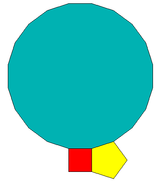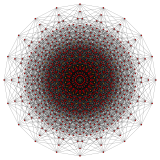Icosagon
| Regular icosagon | |
|---|---|
 A regular icosagon | |
| Type | Regular polygon |
| Edges and vertices | 20 |
| Schläfli symbol | {20}, t{10}, tt{5} |
| Coxeter diagram | |
| Symmetry group | Dihedral (D20), order 2×20 |
| Internal angle (degrees) | 162° |
| Dual polygon | Self |
| Properties | Convex, cyclic, equilateral, isogonal, isotoxal |
An icosagon is a shape with 20 sides and 20 corners. It has interior angles of 162 and exterior angles of 18.
Regular icosagon[change | change source]
The regular icosagon has Schläfli symbol {20}, and can also be constructed as a truncated decagon, t{10}, or a twice-truncated pentagon, tt{5}.
Area[change | change source]
The amount of space a regular icosagon takes up is
a is the length of one of its sides.
Uses[change | change source]
The Big Wheel on the popular US game show The Price Is Right has an icosagonal cross-section.
The Globe, the outdoor theater used by William Shakespeare's acting company, was discovered to have been built on an icosagonal foundation when a partial excavation was done in 1989.[1]
As a golygonal path, the swastika is considered to be an irregular icosagon.[2]
 A regular square, pentagon, and icosagon can completely fill a plane vertex.
A regular square, pentagon, and icosagon can completely fill a plane vertex.
Dissection[change | change source]
Coxeter states that every parallel-sided 2m-gon can be divided into m(m-1)/2 rhombs. For the icosagon, m=10, and it can be divided into 45: 5 squares and 4 sets of 10 rhombs. This decomposition is based on a Petrie polygon projection of a 10-cube, with 45 of 11520 faces. [3] The list A006245 enumerates the number of solutions as 18,410,581,880, including up to 20-fold rotations and chiral forms in reflection.

|

|


